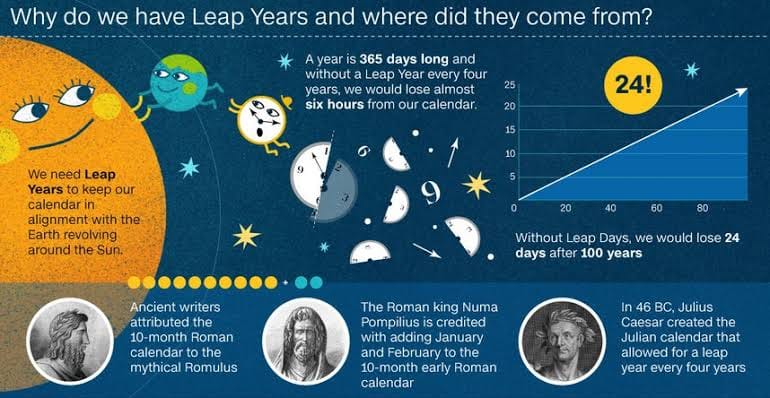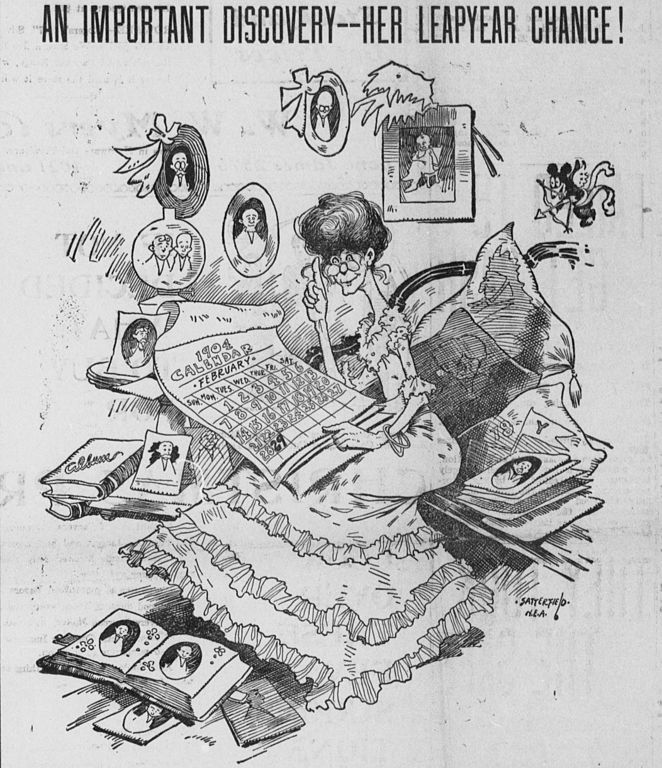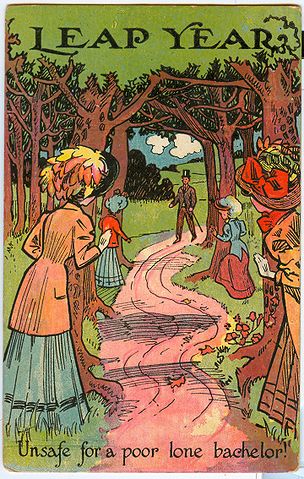
By Meghan E. Gattignolo
Yes, 2024 is a Leap Year! What is Leap Year and why is it something we care about? Do you know any leaplings? Is there anything people around the world do differently on Leap Day? Read on to find out more than you could ever want to know about Leap Year.
- Leap Year has been around since Julius Caesar
Julius Caesar and his Julian calendar instituted the rule of adding a day every four years. The time it takes in days for Earth to revolve around the Sun – a solar year – isn’t a round number. It’s 365.242 days. Adding an extra day keeps the calendar in check and lessens confusion.
- But it doesn’t actually happen every four years
Because of math, every so often a Leap Year has to be skipped to keep the days of the year in balance. If a century year is divisible by 400, it’s a Leap Year. If not, it’s skipped. 1700 and 1900 should have been Leap Years, but were skipped. The next skipped Leap Year is 2100.

britannica.com
- A rare creature is born on Leap Day
How would you feel if your birthday only happened every four years? I’m sure it’s an odd feeling that would make you feel left out. Apparently, there’s also a name for these poor souls: leaplings. There are only about 5 million people in the world who can call themselves a leapling. If you have a leapling in your life, make sure they feel extra special this year!
- Leap Day is unlucky for some
Some countries consider Leap Year to be the unluckiest of times. In Greece and Italy, if you get married or get divorced during a Leap Year, you’re supposedly destined for unhappiness. In Scotland, Leap Years are considered bad years for sheep. In some places, there’s just a general feeling of doom and gloom surrounding a Leap Year. 2020 was the last Leap Year… so maybe there’s something to that superstition.
- But extra special for others
On the Texas-New Mexico border sits a quirky little town of only about 5,000 people called Anthony. Anthony is situated along where a few of the westward trade routes were located during the 19th century. Now, its claim to fame is that it holds the biggest Leap Day celebration in the world. Since 1988, a two-day long festival has been raging every Leap Year. It was started by two leapling residents and was originally meant to be a big Leap Day birthday party. While the festival continues to celebrate leapling babies, it’s grown to be much bigger than that and attracts lots of tourists every four years.

While examining the calendar for the upcoming year of 1904, a spinster is reminded of leap year, and of the tradition which states that women can propose marriage on February 29.
Bob Satterfield, cartoonist
The Tacoma Times, December 23, 1903

Humorous leap year postcard showing bachelor walking along a path with numerous women lying in wait.
Postmarked October 28, 1908
- A chance to flip tradition
Since the lifetime of St. Brigid in Ireland, it’s been a custom for women to propose to men on Leap Day, also referred to as Ladies’ Privilege. This tradition spread to Britain, Scotland and even Denmark. Each adopted their own variation. In Scotland, a woman must wear a red coat to propose in. In Denmark, if the man refuses the proposal, he has to buy the lady 12 pairs of gloves. On May 1, one beautiful way men express their love for the lady in their lives is to ribbon-bomb a birch tree. In another gender role flip, women do it instead on Leap Day.
- One-of-a-kind newspaper
Since 1980, a special French newspaper has only been published on Leap Day. La Bougie du Sapeur is only available on February 29, and it usually outsells all other newspapers on that day.
When it comes down to it, a leap year means you get an extra day. What will you do with your extra 24 hours this month? Make it special and try something new!
Resources
https://www.countryliving.com/uk/news/a46658567/leap-year-traditions/
https://www.cnn.com/2020/02/28/us/why-do-we-have-leap-year-trnd/index.html
https://dailypassport.com/leap-year-capital-of-world-anthony-new-mexico-texas/
https://www.independent.co.uk/life-style/leap-year-superstitions-traditions-b2472338.html

Meghan E. Gattignolo is a freelance writer and longtime Clarksville, TN resident. She loves to obsess about historical subjects and annoy her family daily with unsolicited random facts. Meghan holds a History B.A. from Austin Peay State University and lives in town with her husband and two daughters.